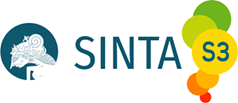Visualisasi Aljabar untuk Memecahkan Masalah Realistis Berplatform E-Learning Moodle
DOI:
https://doi.org/10.33394/mpm.v13i1.12163Keywords:
Algebra Visualization, Realistic Problem Solving, Moodle e-learningAbstract
The purpose of this study is so that second semester students who take linear algebra courses are able to analyze their visualization understanding in solving problems presented with real life. Specifically we want to know: 1) how they understand the problem; 2) how to visualize the problem; 3) how they get the conclusion from their visualization; 4) how it impacts the course itself on the moodle e-learning platform. The type of research used is qualitative with descriptive-explorative methods, namely exploring all things that exist in the implementation of learning, processing problems and their answer steps, visualizing algebra, e-learning platforms, and exploring the results of surveys and interviews of students.The subjects in this study were all students who took elementary linear algebra courses in classes A1, A2, and B totaling 81 students who were gathered in one lecture class together in Building B of Tanjungpura University. Data from written tests, surveys, questionnaires, and responses were then explored descriptively to get conclusions in accordance with the problem formulation. Based on the analysis of several scientific journals on mathematical visual thinking skills in solving mathematical problems, visualization can improve the development of thinking, mathematical understanding from non-concrete to concrete. According to several journal sources reviewed, there are several ways to solve problems by implementing mathematics learning programs that increase learners' understanding and responsiveness when solving problems including: open minds approach, meansends learning, collaborative learning, trade-a-problems learning, problem and project based learning, visual thinking learning, RME, CTL, and eliminatin aplikation learning.
Downloads
Published
How to Cite
Issue
Section
Citation Check
License
Authors who publish with this journal agree to the following terms:
- Authors retain copyright and grant the journal right of first publication with the work simultaneously licensed under a Creative Commons Attribution License that allows others to share the work with an acknowledgement of the work's authorship and initial publication in this journal.
- Authors are able to enter into separate, additional contractual arrangements for the non-exclusive distribution of the journal's published version of the work (e.g., post it to an institutional repository or publish it in a book), with an acknowledgement of its initial publication in this journal.
- Authors are permitted and encouraged to post their work online (e.g., in institutional repositories or on their website) prior to and during the submission process, as it can lead to productive exchanges, as well as earlier and greater citation of published work (See The Effect of Open Access).
Â













